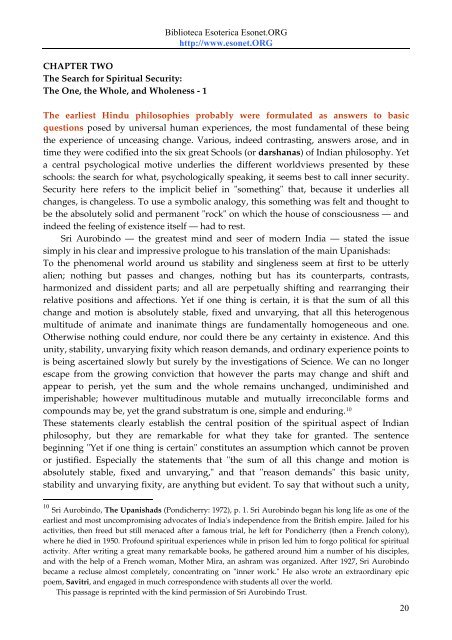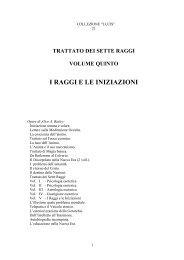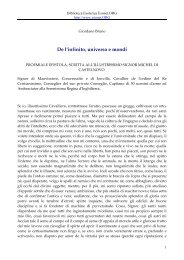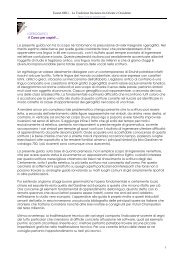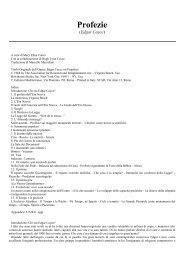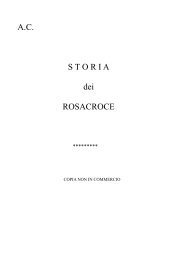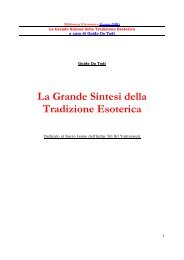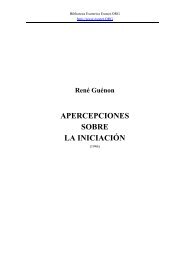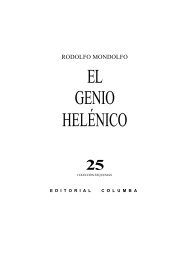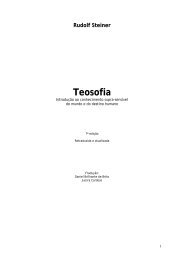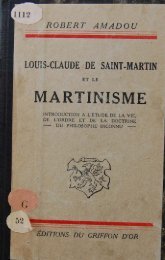Biblioteca Esoterica Esonet.ORG http://www.esonet.ORG 1
Biblioteca Esoterica Esonet.ORG http://www.esonet.ORG 1
Biblioteca Esoterica Esonet.ORG http://www.esonet.ORG 1
Create successful ePaper yourself
Turn your PDF publications into a flip-book with our unique Google optimized e-Paper software.
CHAPTER TWO<br />
The Search for Spiritual Security:<br />
The One, the Whole, and Wholeness - 1<br />
<strong>Biblioteca</strong> <strong>Esoterica</strong> <strong>Esonet</strong>.<strong>ORG</strong><br />
<strong>http</strong>://<strong>www</strong>.<strong>esonet</strong>.<strong>ORG</strong><br />
The earliest Hindu philosophies probably were formulated as answers to basic<br />
questions posed by universal human experiences, the most fundamental of these being<br />
the experience of unceasing change. Various, indeed contrasting, answers arose, and in<br />
time they were codified into the six great Schools (or darshanas) of Indian philosophy. Yet<br />
a central psychological motive underlies the different worldviews presented by these<br />
schools: the search for what, psychologically speaking, it seems best to call inner security.<br />
Security here refers to the implicit belief in "something" that, because it underlies all<br />
changes, is changeless. To use a symbolic analogy, this something was felt and thought to<br />
be the absolutely solid and permanent "rock" on which the house of consciousness — and<br />
indeed the feeling of existence itself — had to rest.<br />
Sri Aurobindo — the greatest mind and seer of modern India — stated the issue<br />
simply in his clear and impressive prologue to his translation of the main Upanishads:<br />
To the phenomenal world around us stability and singleness seem at first to be utterly<br />
alien; nothing but passes and changes, nothing but has its counterparts, contrasts,<br />
harmonized and dissident parts; and all are perpetually shifting and rearranging their<br />
relative positions and affections. Yet if one thing is certain, it is that the sum of all this<br />
change and motion is absolutely stable, fixed and unvarying, that all this heterogenous<br />
multitude of animate and inanimate things are fundamentally homogeneous and one.<br />
Otherwise nothing could endure, nor could there be any certainty in existence. And this<br />
unity, stability, unvarying fixity which reason demands, and ordinary experience points to<br />
is being ascertained slowly but surely by the investigations of Science. We can no longer<br />
escape from the growing conviction that however the parts may change and shift and<br />
appear to perish, yet the sum and the whole remains unchanged, undiminished and<br />
imperishable; however multitudinous mutable and mutually irreconcilable forms and<br />
compounds may be, yet the grand substratum is one, simple and enduring. 10<br />
These statements clearly establish the central position of the spiritual aspect of Indian<br />
philosophy, but they are remarkable for what they take for granted. The sentence<br />
beginning "Yet if one thing is certain" constitutes an assumption which cannot be proven<br />
or justified. Especially the statements that "the sum of all this change and motion is<br />
absolutely stable, fixed and unvarying," and that "reason demands" this basic unity,<br />
stability and unvarying fixity, are anything but evident. To say that without such a unity,<br />
10 Sri Aurobindo, The Upanishads (Pondicherry: 1972), p. 1. Sri Aurobindo began his long life as one of the<br />
earliest and most uncompromising advocates of India's independence from the British empire. Jailed for his<br />
activities, then freed but still menaced after a famous trial, he left for Pondicherry (then a French colony),<br />
where he died in 1950. Profound spiritual experiences while in prison led him to forgo political for spiritual<br />
activity. After writing a great many remarkable books, he gathered around him a number of his disciples,<br />
and with the help of a French woman, Mother Mira, an ashram was organized. After 1927, Sri Aurobindo<br />
became a recluse almost completely, concentrating on "inner work." He also wrote an extraordinary epic<br />
poem, Savitri, and engaged in much correspondence with students all over the world.<br />
This passage is reprinted with the kind permission of Sri Aurobindo Trust.<br />
20


